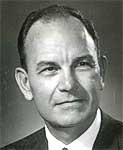Was Paul Geren Our First Peace Corps Writer? Part Two
Paul Francis Geren was deeply religious. And his religion, it appears to me, propelled him through his life, aiding him in his journey from Rangoon to Ramgarh, the legendary march out of Burma, and through dozens of other appointments, foreign and domestic, government and academic.
The pivotal point of this man’s life, however, was his escape from Burma that he details in Burma Diary, his short articulate memoir that was published by Harper & Brothers in 1943, and became an immediate best seller. It is a story told with quiet dignity, much like the man himself who is described often by others as  “a quiet, studious looking individual.”
“a quiet, studious looking individual.”
But first, a quick survey summary of WWII for all of us who missed the war, thanks to Harold J. Schultz, Chairman of the International Studies at Stetson University. Schultz wrote about Paul when Geren became the fifth president of that Florida college:
The Battle of Britain ended in the Fall of 1941. For more than a year the German Luftwaffe had crossed the Channel every evening at dusk to drop their incendiary bombs on London and other major cities. The Brits fought on alone.
Impatient for success and confident of victory, Hitler next unleashed 150 divisions against Soviet Russia in June, 1941. Now Great Britain had an ally in Russia. The Germany armies were successful at first in Eastern Europe as they had been on the western front a year earlier. But then the Germans failed to capture Moscow and Stalingrad.
The isolationism of the United States ended when the Axis forces third partner, Imperial Japan, struck Pearl Harbor. Our illusions that a World War could be anything less than global ended on December, 7, 1941.
The Japanese march of aggression, which had begun in Manchuria in 1931, picked up steam as Imperial Japan decided to carve out an empire in the East that could match her Axis partner in the West. In quick succession Hong Kong, Manila, Singapore, Bataan, and Corregidor all fell. Japan pushed into Burma in a lightning move that made the entire Indian subcontinent vulnerable to conquest.
In his Diary, Geren described the air raid attack on December 23, 1941:
This morning the first bombs fell on Rangoon. Before they fell, life thronged the streets of the city. (She is more an Indian than a Burmese city.) There were dock workers and rickshaw men, worn of hand by the shafts, worn of foot by the paying stones, messengers, coolies awaiting any work that might be offered. First an air-raid siren, a filling of the air with planes, attacking and defending, a rain of bombs, and fifteen hundred people, mostly these Indian workers, trapped in the street, are dead. Twenty minutes in the dimension of time have just encompassed a thousand years in the dimension of hope and fear. Twenty minutes have seen more people die than did the heaviest all-night raid on London.
Geren’s classroom at the college was turned into a field hospital and when Dr. Gordon Seagrave, the famed Burma surgeon, who had mobilized his Baptist Hospital in Namkham to provide care for the Chinese soldiers who had come to Burma to fight the Japanese, arrived from North Burma with six Lend-Lease trucks, he needed drivers and Geren volunteered.
General Joseph W. Stilwell, the senior American military officer in Southeast Asia, who took command of American forces, such as they were, in China, Burma, and India, commissioned Dr. Seagrave as a major. “I tried to join up in Rangoon,” Geren said later. “They said there was no one qualified to give a physical examination. So I remained a civilian.”
End of Part Two
No comments yet.
Add your comment